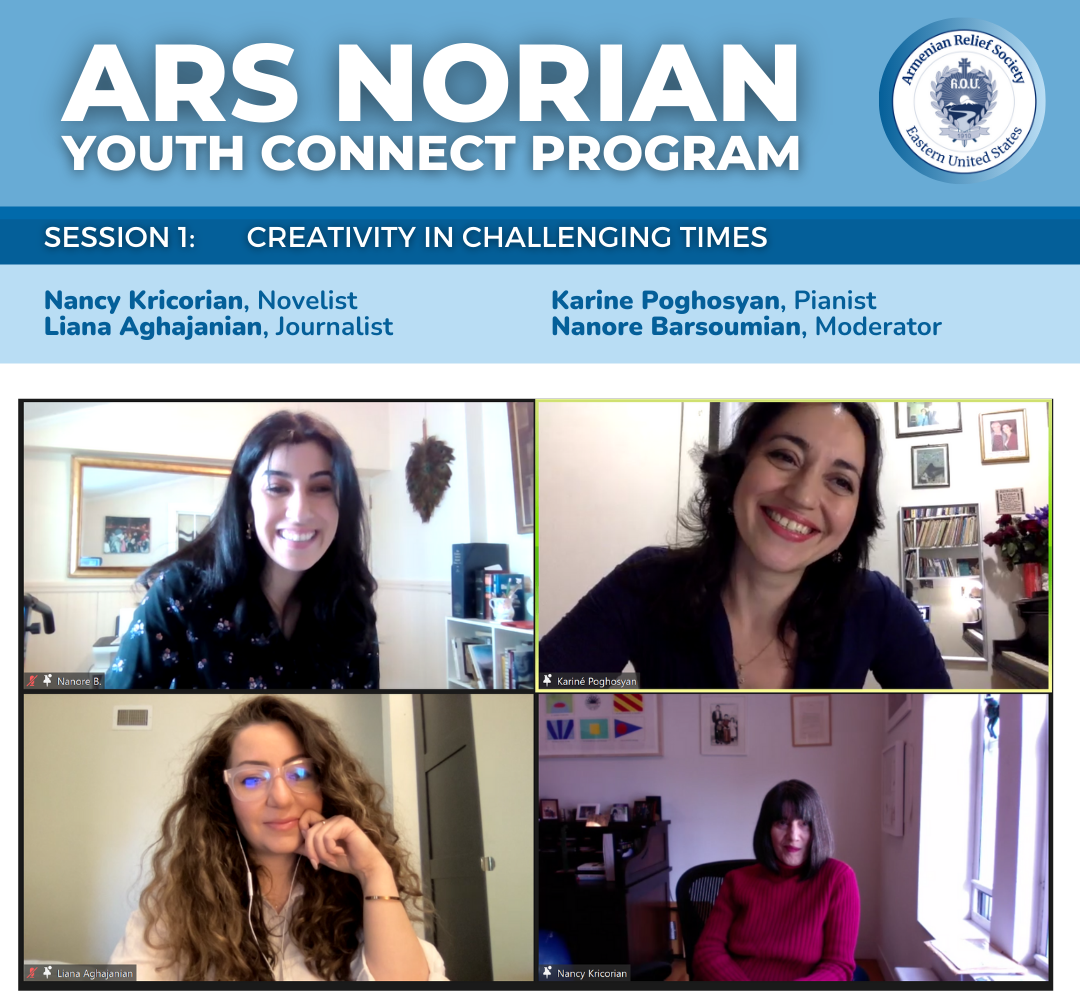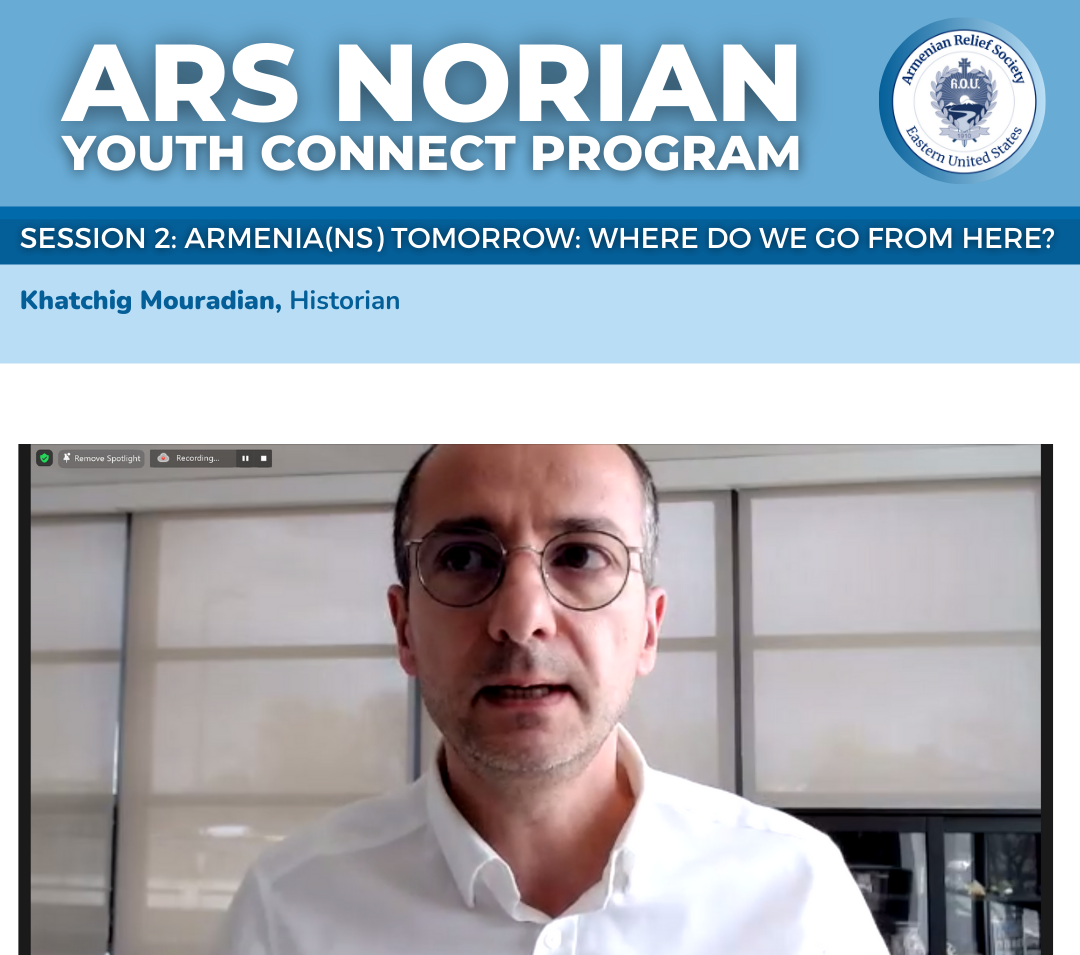The Armenian Relief Society (ARS) of Eastern United States hosted the virtual Norian Youth Connect Program (YCP) on March 26, gathering together some of the brightest minds in the diaspora to chart pathways forward for an Armenian community recovering from war and its traumas.
 During the first half of the program, former Armenian Weekly editor Nanore Barsoumian moderated a panel discussion featuring journalist Liana Aghajanian, novelist Nancy Kricorian and pianist Kariné Poghosyan titled “Creativity in Challenging Times.” Dr. Khatchig Mouradian, director of the YCP, then delivered a lecture titled, “Armenia(ns) Tomorrow: Where do we go from here?”
During the first half of the program, former Armenian Weekly editor Nanore Barsoumian moderated a panel discussion featuring journalist Liana Aghajanian, novelist Nancy Kricorian and pianist Kariné Poghosyan titled “Creativity in Challenging Times.” Dr. Khatchig Mouradian, director of the YCP, then delivered a lecture titled, “Armenia(ns) Tomorrow: Where do we go from here?”
The three panelists shared their advice for how to create art and writing under the psychological pressures of tragedy and crisis, specifically the impacts on the Armenian Diaspora of witnessing the ongoing conflict in Artsakh from afar.
Kricorian shared a quote from author Grace Paley that motivates her writing and political activism.
“[Paley] said, the only recognizable feature of hope is action. Both in terms of doing my writing, which is a kind of action, and doing my organizing work, which is a kind of action, and being in community with people doing organizing, supporting each other as artists, that’s how you keep yourself going and sustain yourself,” Kricorian said.
According to Poghosyan, Armenians struggle with letting go of perpetual guilt, since if “we’re not suffering, something is wrong.”
“You can’t be helpful if you are suffering. You have to do whatever you can to bring yourself back to the center, bring yourself back to a calm place where you are thinking clearly so there is peace inside even if there isn’t peace outside. Focus on something that fills your heart with joy. Make it a point to consciously go there every day,” Poghosyan said.
Aghajanian encouraged participants to focus on a personal passion project that may not be created for an audience or readership, like she has done throughout the pandemic.
“Whether that’s growing a garden or writing for yourself, not sharing it with the world, something that can just be yours. With our lives playing out online, we give so much ownership of ourselves to other people and the internet. The biggest thing for me was doing something no one can touch, whether that was physically or digitally.”
The panelists also spoke to their fraught relationships with social media. As artists and writers with online visibility, each of the panelists shared their misgivings about social media, particularly the detrimental effects of constant engagement with news of war and violence on mental health. Nonetheless, the panelists also spoke to the opportunities social media has created for sharing their work with larger audiences.
Poghosyan recorded her last of 100 Facebook Live Mini Concerts on March 25. Every Friday evening since the start of the pandemic in March 2020, she performed a different piano composition from her vast repertoire for virtual audiences.
“It was the most beautiful thing to see literally people from all four corners of the world coming together at the same time,” Poghosyan said. “Music is an enormously healing source. It’s also incredibly unifying. You don’t need language. It speaks to everyone. It doesn’t matter what the color of your skin is or what your faith is.”
Aghajanian said that while she laments that social media is not suited for complex conversations without judgment, she believes that it has opened up new possibilities for connection within the vast Armenian community.
“Social media has allowed Armenians to know each other in ways we did not know each other before. We’re not afraid to discuss topics that might be taboo or shameful. The only way we can get somewhere is by talking through it. That process itself is healing,” Aghajanian said.
Ultimately, each of the panelists reflected on balancing their creativity and personal projects with the political demands that have become particularly acute for the Armenian Diaspora in the past two years.
“There’s a sense sometimes that art should be propaganda for the Armenian cause,” Kricorian said. “I’m not interested in my art being propaganda. I’m interested in conveying truth. Most of the time that truth has a good political purpose.”

During his portion of the program, Mouradian addressed the question of responsibility for the defeat in the 2020 Artsakh War. According to Mouradian, the challenges facing Armenia cannot be overcome until Armenians in the state and the diaspora accept that the war was lost and claim their share of the responsibility for the defeat.
“We often talk about denial in the context of Turkey. It’s important to look at ourselves and be careful not to engage in it in such a profound way that can be as damaging as denial of the Armenian Genocide by the Turkish state,” Mouradian said.
Mouradian drew on the example of the generation that survived the Armenian Genocide and carried the burden for reviving and rebuilding Armenian communities across the world. That generation produced artists and intellectuals who became a source of inspiration to Armenians in the face of pervasive grief and helplessness. It also engaged in the rebuilding of institutions, which in Mouradian’s view is vital to strengthening Armenia today.
“It’s important not to feel like, if we just do our little bit, by being active, by being engaged, by creating, that it’s going to have an impact on an institutional level,” he said.
He encouraged viewers to participate in helping build and strengthen institutions in Armenia and in the diaspora that can attract visionaries and sustain the community.
“If 100 plus years ago, our ancestors could do it, we can do it too,” he said.



Be the first to comment